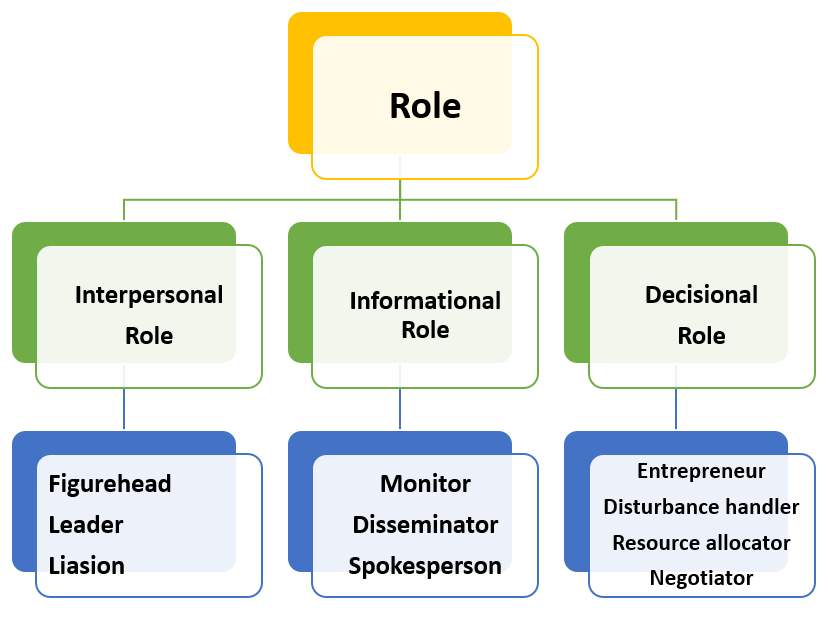It is important to know “what managers actually do”. Managers play a variety of roles in organisation to manage the work. Henry Mintzberg criticized the traditional functional approach. He concluded that functions “tell us little about what managers actually do. At best they indicate some vague objectives managers have when they work. Managers do not act out the classical classification of managerial functions. Instead, they engage in a variety of other activities.” Roles are organized set of behaviours. These are behavioural patterns.

After studying several managers at work, Mintzberg classified their behaviours into three distinct areas or roles- interpersonal, informational, and decisional. Figure 1.2 shows that managers have formal authority, status, personal characteristics and skills to perform these roles effectively.
- Interpersonal Roles:
There are three interpersonal roles inherent in the manager’s job. This set of roles derives directly from the manager’s formal position. As the figurehead for his unit, he stands as a symbol of legal authority, performing certain ceremonial duties e.g., signing documents and receiving visitors. The manager in a leader role hires, trains, and motivates his personnel. In the liaison role, manager interacts with many people outside the immediate chain of command, those who are neither subordinates nor superiors.
Liaison:
In this role of liaison, every manager must cultivate contacts outside his vertical chain of command to collect information useful for his organization.
Leader:
As a leader, every manager must motivate and encourage his employees. He must also try to reconcile their individual needs with the goals of the organization.
Figurehead:
In this role, every manager has to perform some duties of a ceremonial nature, such as greeting the touring dignitaries, attending the wedding of an employee, taking an important customer to lunch, and so on.
- Informational Roles:
Informational roles are important because information is the lifeblood of organizations and the manager is the nerve center of his unit. As a monitor, the manager is a receiver and collector of information. Information is acquired through meetings, conversations, or documentation. In the disseminator role, managers distribute information to subordinates daily. As a spoke-person, the manager transmits information to individuals outside the organization. This role is present in all managerial jobs.
Disseminator:
In the role of a disseminator, the manager passes some of his privileged information directly to his subordinates who would otherwise have no access to it.
Monitor:
As monitor, the manager has to perpetually scan his environment for information, interrogate his liaison contacts and his subordinates, and receive unsolicited information, much of it as result of the network of personal contacts he has developed.
Spokesman:
In this role, the manager informs and satisfies various groups and people who influence his organization. Thus, he advises shareholders about financial performance, assures consumer groups that the organization is fulfilling its social responsibilities and satisfies government that the origination is abiding by the law.
- Decisional Roles:
To get the work done, managers have to make decisions. In performing the decision-making role, managers act as entrepreneur, disturbance handler, resource allocator, and negotiator. In playing the entrepreneurial role, managers actively design and initiate changes within the organization. It involves some improvements.
As a disturbance handler, the manager handles difficult problems and non-routine situations such as strikes, energy shortages etc. As resource allocator, the manager decides how resources are distributed, and with whom he will work most closely. The fourth decisional role is that of negotiator. Managers negotiate with suppliers, customers, unions, individual employees, the government, and other groups.
It is important to note that neither the functional (process) nor the role approach provides complete insight into many aspects of a manager’s daily routine. Managers should integrate the role-oriented approach with the traditional process approach, because it is, as Jon Pierce says, through the interpersonal, informational, and decisional roles that managers execute the planning, organizing, directing and controlling functions.
Disturbance Handler:
In this role, the manager has to work like a fire-fighter. He must seek solutions of various unanticipated problems – a strike may loom large a major customer may go bankrupt; a supplier may renege on his contract, and so on.
Entrepreneur:
In this role, the manager constantly looks out for new ideas and seeks to improve his unit by adapting it to changing conditions in the environment.
In addition, managers in any organization work with each other to establish the organization’s long-range goals and to plan how to achieve them. They also work together to provide one another with the accurate information needed to perform tasks. Thus, managers act as channels of communication with the organization.
Negotiator:
The manager has to spend considerable time in negotiations. Thus, the chairman of a company may negotiate with the union leaders a new strike issue; the foreman may negotiate with the workers a grievance problem, and so on.